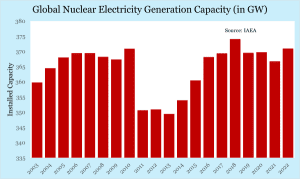TAG: GS 3: ECOLOGY AND ENVIRONMENT
THE CONTEXT: The global push for nuclear energy as a climate solution has gained momentum in recent years, with advocates highlighting its potential to address challenges related to climate change and energy security.
EXPLANATION:
- Despite significant advantages, such as minimal carbon footprint and perennial availability, nuclear energy faces hurdles that impede its widespread adoption.
- We will look into the factors driving the push for nuclear energy, challenges hindering its uptake, and India’s stance on nuclear power expansion.

Global nuclear energy generation capacity in GW.
Advantages of Nuclear Energy:
- Nuclear energy is lauded for its minimal carbon footprint, making it a viable alternative to fossil fuels for electricity generation.
- The entire life cycle of nuclear power results in negligible emissions, significantly lower than coal-fired electricity and comparable to renewable sources like solar and wind.
- Perennial availability distinguishes nuclear energy as suitable for baseload electricity generation, offering stability that intermittent renewables may lack.
- Recognized by the IPCC, nuclear energy plays a crucial role in decarbonization pathways, contributing to substantial greenhouse gas emissions avoidance.
Challenges to Nuclear Energy Uptake:
- Safety concerns, exacerbated by events like the Fukushima accident, contribute to apprehensions surrounding nuclear energy adoption.
- High capital investments, prolonged construction timelines, and stringent regulations deter countries from pursuing nuclear power projects.
- Limited technological advancements in nuclear sector compared to renewables hinder cost reductions and scalability.
- Despite its potential, nuclear energy constitutes less than 10% of global electricity generation, with operational reactor numbers declining in recent years.
Global Push and Recent Initiatives:
- Efforts by global nuclear advocates, including the IAEA, aim to garner greater acceptance and support for nuclear energy.
- The IAEA’s ‘Atoms4Climate’ initiative and engagement with climate conferences highlight nuclear energy’s role in clean energy transition.
- The Nuclear Energy Summit in Brussels underscores international collaboration to promote nuclear energy as a solution to climate challenges.
- Despite challenges, nuclear energy remains integral to achieving net-zero emissions and addressing the climate emergency.
India’s Position on Nuclear Energy:
- India acknowledges the role of nuclear energy in its decarbonization strategy, aiming for rapid expansion in the coming years.
- The country plans to triple its nuclear power capacity by 2031-32, although its share in total electricity generation is expected to remain modest.
- India’s participation in global nuclear initiatives, such as the Brussels Summit, demonstrates its commitment to nuclear energy as a clean and reliable electricity source.
- Former officials advocate for accelerated growth of India’s nuclear sector, emphasizing its importance in meeting future energy demands.




